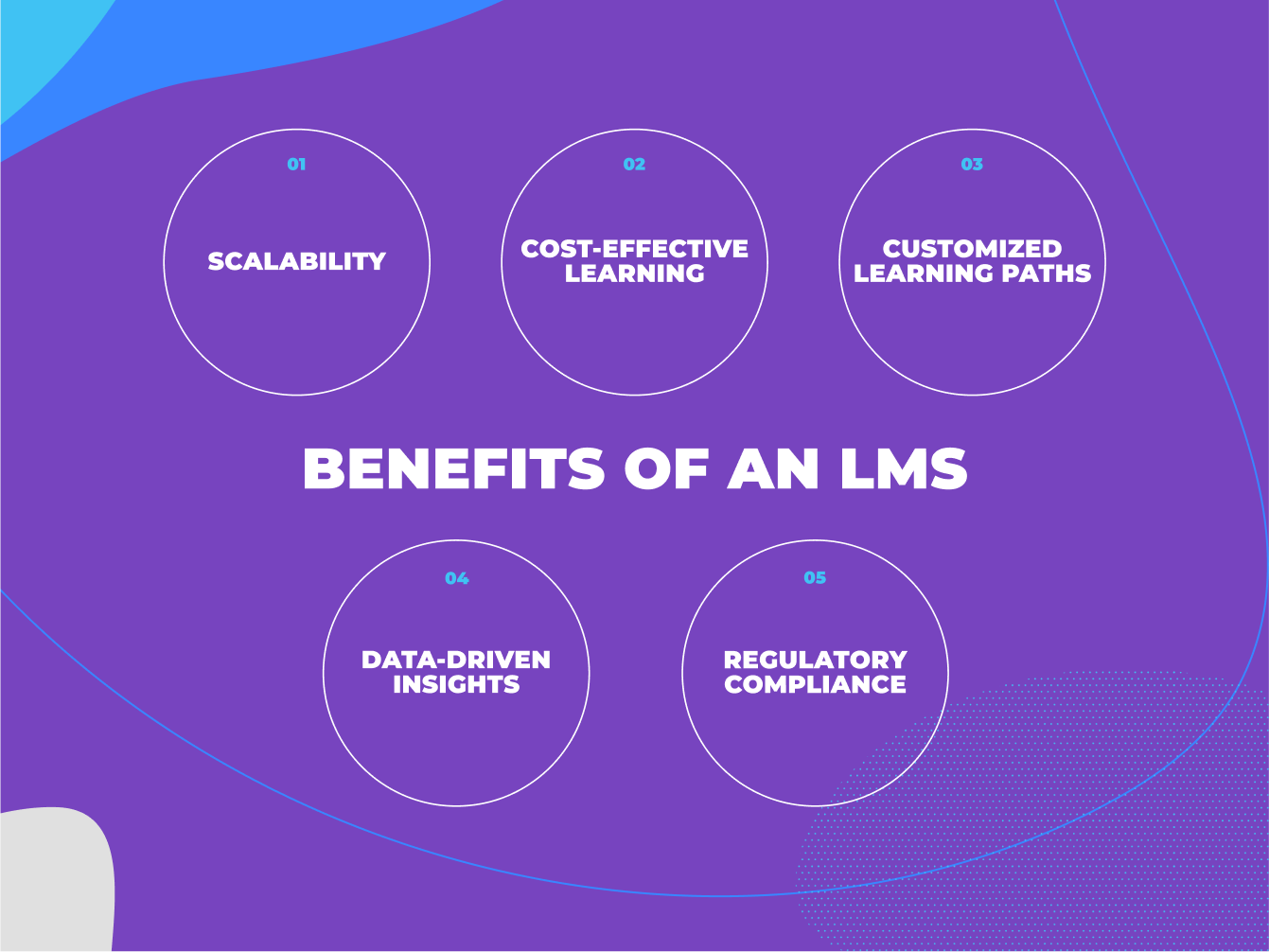You may wonder “What is an LMS,” as the acronym for learning management systems is often talked about in the corporate training space. An LMS, or a learning management system, consolidates your training and learning materials in one convenient place — and it's no longer reserved for large organizations.
A key element has developed at the center of firms' strategic evolution as they adjust to the current world's rapid speed of change: efficient learning and development. Central to this endeavor is the LMS. In this comprehensive guide, we’ll explain what an LMS is, how it works, and why it's a fundamental tool for organizations globally. We'll also share insight on LMS functions, benefits, types, and more.
Unveiling the role of learning management systems in corporate training
A learning management system (LMS) is a software platform designed to streamline corporate training by managing and delivering online learning content. Organizations leverage these learning platforms for employee education, compliance training, and professional development courses. Above all, these learning systems promote continuous learning cultures, which is a key initiative for businesses of all sizes. According to the 2023 LinkedIn Learning Report, 89% of learning and development professionals agree that proactively building employee skills for today and tomorrow will help navigate the evolving future of work – solidifying the importance of a comprehensive learning strategy.
What is an LMS?
An LMS is a software or digital learning platform designed to create, manage, deliver, and assess training courses and learning programs. It serves as a centralized tool to manage end-to-end training and educational processes in an organization – supporting both the work of learning and development (L&D) administrators and the learning journey of employees.
An LMS provides learners and admin with a robust, flexible platform to manage training programs across various formats and scales while simultaneously monitoring and assessing users’ progress and performance. With modern-day LMS platforms, L&D administrators can even customize learning experiences for unique groups, from employees to customers to channel partners.
On the learner side, an LMS enables users to access content on an intuitive platform. The emergence of the LMS is tightly intertwined with the digital transformation journey, giving learners the tools to access material anytime, anywhere. For example, many LMS come equipped with a mobile app, empowering learners to engage in interactive learning experiences such as videos and games.
By empowering both administrators and learners, an LMS helps organizations seamlessly facilitate learning to meet current and future business goals.
What does an LMS do exactly?
An LMS enables businesses to deliver online training and learning experiences through technology. It can host vast amounts of data and functions, including content libraries, reporting and analytics, performance, and eCommerce.
Key organizational processes like employee onboarding and compliance training are simplified via an LMS through automated scheduling, enrollment, and course access. An intuitive LMS can also deliver customer training and employee development, empowering both sets of learners to build knowledge.
Professional development via an LMS gives learners the tools they need to continue growing in their jobs as they advance through their careers. According to LinkedIn Learning's 2023 Workplace Learning Report, 89% of L&D pros agree that proactively building employee skills will help navigate the evolving future of work.
Historically, corporate training was primarily carried out in person, with trainers delivering information to groups of employees in a classroom setting. However, as tech developed, it became clear that companies needed a more flexible, scalable learning system. Over the past two decades, LMS platforms evolved to become more feature-rich and learner-centric, integrating elements like social learning and artificial intelligence capabilities to enhance the learning experience. In today’s modern workplace, an LMS is a fundamental tool for organizations globally because it provides a centralized platform to manage and deliver training programs.
How can an LMS benefit your organization?
A robust learning platform provides your organization and learners with a variety of benefits, no matter your company's size or your learners' goals.
1.
Scalability
An LMS allows for the delivery of training to a large number of employees across different locations, breaking down geographical barriers.
2.
Cost-effective learning
By eliminating costs associated with traditional training methods (e.g., venue, instructor fees, travel expenses, and physical materials), an LMS offers a more cost-effective solution.
3.
Customized learning paths
An LMS can adapt to individual learning styles and paces, promoting better engagement and knowledge retention.
4.
Data-driven insights
By tracking and analyzing learning behaviors and performance, an LMS provides valuable insights that can refine training programs.
5.
Regulatory compliance
Many LMS platforms offer features to assist in maintaining compliance with industry regulations, including delivering mandatory training and tracking completion.
The benefits of an LMS are multi-dimensional, capable of empowering organizations across a wide spectrum of industries and business areas. Along with the benefits of an LMS, there are also several specific LMS use cases to appreciate the transformative potential learning system:
- Employee onboarding: One of the first encounters an employee often has with an LMS is during the onboarding process. During employee onboarding, an LMS serves as a virtual orientation platform, providing new hires with information about the company culture, policies, and their role. This fosters a smooth transition, helping new hires become productive faster.
- Continuous training: An LMS can ensure ongoing training and upskilling for employees, crucial in today's rapidly evolving business environment. By offering access to a library of courses, employees can learn at their own pace, choosing the content most relevant to their roles and career aspirations. This encourages a culture of continuous learning and development, resulting in more skilled and satisfied employees.
- Compliance training: Many industries have strict compliance requirements that demand regular training. An LMS simplifies the delivery and tracking of regulatory and compliance training, ensuring that employees stay updated with the latest regulations and that the organization can provide evidence of compliance when required.
- Sales and product training: An LMS can provide comprehensive training for sales personnel, detailing product features, market trends, and selling techniques. Regularly updated content can ensure that the sales team is always equipped with the latest information, thereby enhancing their ability to sell effectively.
- Customer training: In addition to internal training, businesses can also use an LMS to educate their customers about their products or services. This type of education can improve customer satisfaction, loyalty, and ultimately, sales.
- Channel training: For organizations that operate through a network of partners, resellers, or agents, an LMS delivers standardized training to ensure that all channel members have consistent and accurate product knowledge and selling skills.
These use cases represent only a fraction of what an LMS can achieve within a business context. As organizations continue to uncover new ways to leverage this versatile tool, the LMS will remain at the forefront of corporate learning and development. Each use case underscores the inherent flexibility of an LMS, its adaptability to a multitude of learning scenarios, and its capacity to support an organization's strategic objectives. Whether facilitating onboarding, promoting continuous learning, or fostering leadership development, an LMS proves itself as an indispensable ally in the pursuit of business success.

What are the different types of LMS?
Some of the different types of LMS available include an on-premise LMS, a cloud-based LMS, an open-source LMS, and an eCommerce LMS.
- Installed or On-Premise LMS: An on-premise LMS is hosted on the company's servers. It often requires a substantial upfront investment but offers greater control over data security and customization.
- Cloud LMS: A more modern approach, the cloud-based LMS is hosted on the provider's servers and accessed over the internet. It is often subscription-based, offering scalability and automatic updates while minimizing the need for IT support.
- Open-Source LMS: An open-source LMS provides access to the source code, allowing organizations to customize the platform to their specific needs. This flexibility can be a significant advantage, but it requires technical expertise to manage and update.
- eCommerce LMS: Some learning platforms come equipped with LMS eCommerce capabilities, allowing organizations to sell their courses online. This is particularly beneficial for businesses in the education or professional training sector.
What are the main functions of an LMS?
The are many functions of an LMS, but two of the core features you can expect in a learning platform are course management and learning delivery. This allows for the development and update of online courses, including the addition of multimedia content and interactive elements. Similarly, learning delivery enables organizations to enroll learners in specific courses and customize learning paths for users.
Beyond these core features, a robust LMS should provide tools for assessing learner performance and generating detailed reports on progress, completion rates, and skills acquisition. Detailed metrics can help your business prove ROI for your learning program and support continued growth for your learning program.
Lastly, more advanced capabilities like system integration and mobile access are proving more valuable in our modern world. A smartly designed LMS can seamlessly integrate with other software systems in the organization, including human resources, web conferencing, customer relationship management, and email systems. Integrating your LMS powers productivity with seamless data syncing and user-friendly connections among your top platforms. Additionally, given the rising trend of remote work and on-the-go learning, mobile compatibility is a must-have feature in an LMS. Many learning platforms come equipped with an LMS mobile app to support learning anytime, anywhere.
Looking ahead to the future of LMS
The LMS is expected to play a bigger role in organizational learning as we move forward. We anticipate seeing LMS platforms make use of cutting-edge technology like virtual reality (VR) and artificial intelligence (AI) to build immersive, highly tailored learning experiences. Additionally, as the emphasis on data-driven decision-making grows, LMS platform analytical capabilities will advance, offering rich insights into learning performance and ROI.
Learning platforms have emerged as a strategic tool for businesses wanting to stay ahead of the curve in our quickly changing corporate world. By offering a unified platform for organizing and delivering engaging, customized learning experiences, an LMS may significantly improve your company’s training initiatives, but it's important to remember that an LMS is only one component of the equation. Your organization's specific needs and goals should guide your choice of LMS. Your company may create a culture of continuous learning with the correct LMS, encouraging employee development and improving business performance. An LMS is therefore more than just a training and development tool. It is a revolutionary platform that enables businesses to maximize the potential of their most important asset—their workforce. The future of corporate learning is here, and it's powered by the LMS.
Level up your learning with Absorb LMS
Look no further than Absorb LMS for an intuitively designed learning system with all the essential elements required to support employee and enterprise success. Our cloud-based platform empowers organizations to drive learning with enhanced flexibility and increased scalability.
For more information about Absorb LMS, request a demo today





